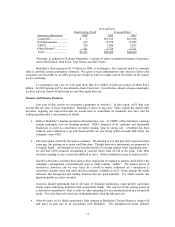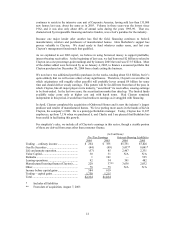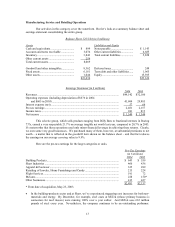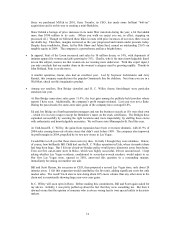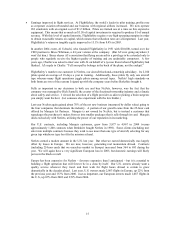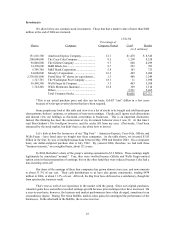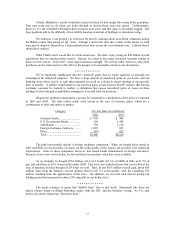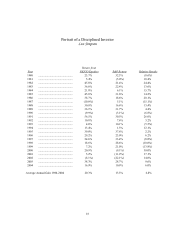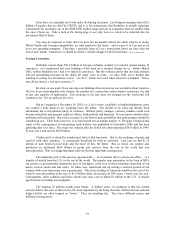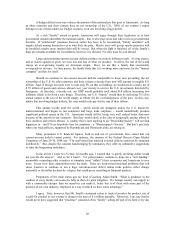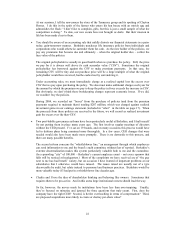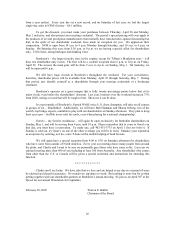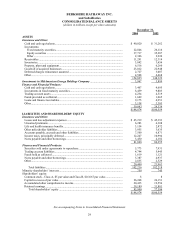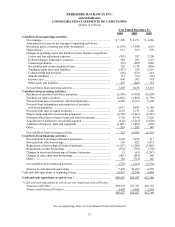Berkshire Hathaway 2004 Annual Report Download - page 22
Download and view the complete annual report
Please find page 22 of the 2004 Berkshire Hathaway annual report below. You can navigate through the pages in the report by either clicking on the pages listed below, or by using the keyword search tool below to find specific information within the annual report.in order to finance its overconsumption. Yet that is just what the “great kingdom” called the United States
is doing.
If the U.S. was running a $.6 trillion current-account surplus, commentators worldwide would
violently condemn our policy, viewing it as an extreme form of “mercantilism” – a long-discredited
economic strategy under which countries fostered exports, discouraged imports, and piled up treasure. I
would condemn such a policy as well. But, in effect if not in intent, the rest of the world is practicing
mercantilism in respect to the U.S., an act made possible by our vast store of assets and our pristine credit
history. Indeed, the world would never let any other country use a credit card denominated in its own
currency to the insatiable extent we are employing ours. Presently, most foreign investors are sanguine:
they may view us as spending junkies, but they know we are rich junkies as well.
Our spendthrift behavior won’ t, however, be tolerated indefinitely. And though it’ s impossible to
forecast just when and how the trade problem will be resolved, it’ s improbable that the resolution will
foster an increase in the value of our currency relative to that of our trading partners.
We hope the U.S. adopts policies that will quickly and substantially reduce the current-account
deficit. True, a prompt solution would likely cause Berkshire to record losses on its foreign-exchange
contracts. But Berkshire’ s resources remain heavily concentrated in dollar-based assets, and both a strong
dollar and a low-inflation environment are very much in our interest.
If you wish to keep abreast of trade and currency matters, read The Financial Times. This
London-based paper has long been the leading source for daily international financial news and now has an
excellent American edition. Both its reporting and commentary on trade are first-class.
* * * * * * * * * * * *
And, again, our usual caveat: macro-economics is a tough game in which few people, Charlie and
I included, have demonstrated skill. We may well turn out to be wrong in our currency judgments.
(Indeed, the fact that so many pundits now predict weakness for the dollar makes us uneasy.) If so, our
mistake will be very public. The irony is that if we chose the opposite course, leaving all of Berkshire’ s
assets in dollars even as they declined significantly in value, no one would notice our mistake.
John Maynard Keynes said in his masterful The General Theory: “Worldly wisdom teaches that it
is better for reputation to fail conventionally than to succeed unconventionally.” (Or, to put it in less elegant
terms, lemmings as a class may be derided but never does an individual lemming get criticized.) From a
reputational standpoint, Charlie and I run a clear risk with our foreign-exchange commitment. But we
believe in managing Berkshire as if we owned 100% of it ourselves. And, were that the case, we would not
be following a dollar-only policy.
Miscellaneous
• Last year I told you about a group of University of Tennessee finance students who played a key
role in our $1.7 billion acquisition of Clayton Homes. Earlier, they had been brought to Omaha by
their professor, Al Auxier – he brings a class every year – to tour Nebraska Furniture Mart and
Borsheim’ s, eat at Gorat’ s and have a Q&A session with me at Kiewit Plaza. These visitors, like
those who come for our annual meeting, leave impressed by both the city and its friendly
residents.
Other colleges and universities have now come calling. This school year we will have visiting
classes, ranging in size from 30 to 100 students, from Chicago, Dartmouth (Tuck), Delaware State,
Florida State, Indiana, Iowa, Iowa State, Maryland, Nebraska, Northwest Nazarene, Pennsylvania
(Wharton), Stanford, Tennessee, Texas, Texas A&M, Toronto (Rotman), Union and Utah. Most
of the students are MBA candidates, and I’ ve been impressed by their quality. They are keenly
interested in business and investments, but their questions indicate that they also have more on
their minds than simply making money. I always feel good after meeting them.
21


